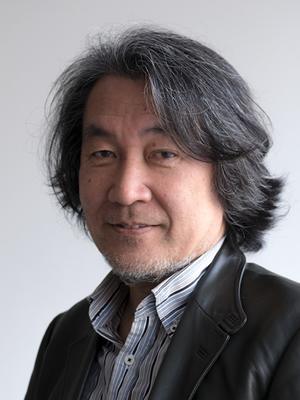In recent years, we have seen the level of attention toward Tokyo gradually increase among people from outside Japan. For a long time, the Western cities themselves which were the model for cities worldwide seem to have reached limits in their civilization, and are seeking new ways of living. Unlike the West where nature and city intentionally oppose each other, reassessment is underway of the unique structure of the city of Edo-Tokyo, where water and greenery are incorporated into the city space, and where the culture of everyday life and esthetics naturally coexist.
Historical interest in Edo-Tokyo grew in the 1980s when Japan became a mature society. It pressed for modernization, and a period of high growth then saw it welcomed into the fold of economic giants. Having achieved material wealth, the Japanese people next gathered momentum towards seeking individuality in their cities, and a cultural identity of their own.

First Director of the Research Center for Edo-Tokyo Studies
Jinnai Hidenobu
Out of this emerged "Edo-Tokyo Gaku" (Edo-Tokyo Studies) that created the new research realms of academic urban studies and regional studies. Until that point, all scholarship in Japan was based on the clear distinction of Edo equating to "Premodern", and Tokyo, to "Modern". It was impossible, however, for cities and people's lives to undergo any immediate change as a result of the Enlightenment. "Edo-Tokyo Studies" was a way to research the development from Edo to Tokyo from within a single perspective.
Our "New Edo-Tokyo Studies" born here transcend the "Edo-Tokyo Studies" of the 1980s to reveal more deeply and widely the special nature of Edo-Tokyo. To this end, our research focus will expand further. Firstly, the span of the eras under consideration will increase, looking back past Premodern Edo as the history of Tokyo-centered definitions of "Edo-Tokyo Studies", to shed light on the foundations of this city/region that existed from before ancient and medieval times - prior to establishment of Edo as castle town - and whose structure are the source of the uniqueness of Tokyo today. The land area of focus will likewise grow, stretching beyond the Edo city limits to the Tokyo lowlands in the east and Musashino and Tama in the west.
Our research activities are not confined to reflecting on history. An important role of this Research Center is to suggest an image of the city in the near future based on experience of its past. Present-day Tokyo produces individualistic, cutting-edge technology and art - a phase at odds with its Western counterparts - and investigating the background to this will prove a major theme.
Japan has a decreasing population and faces an aging society, and a great about-turn in values is necessary. Furthermore, in order to present its own cultural strength in the face of advancing globalization, and to realize the great goal of a sustainable global community, it must draw up a prototype for a future Tokyo-like city, with Edo at its base and supported by its own particular history.
This Research Center will bring to light both the hard and soft aspects of the basic structure from which the unique entity that is the city of Tokyo emerged, and investigate the possibility of a city fit for the 21st century that is not modelled on Western cities. We aim towards a research organization that is open to the world, society, and the local area. We greatly look forward to your participation and cooperation.